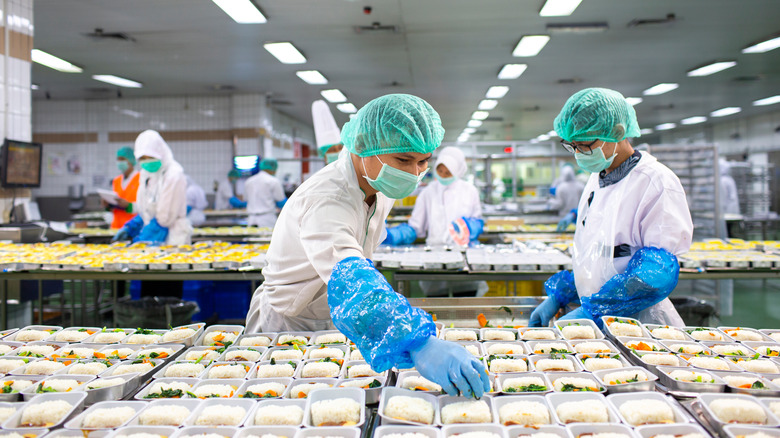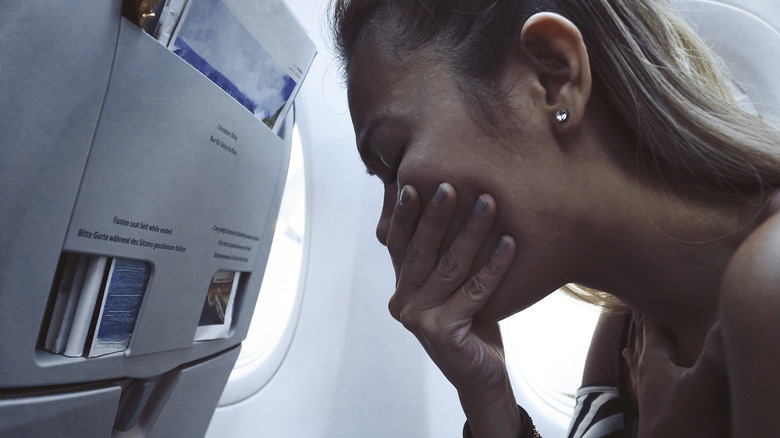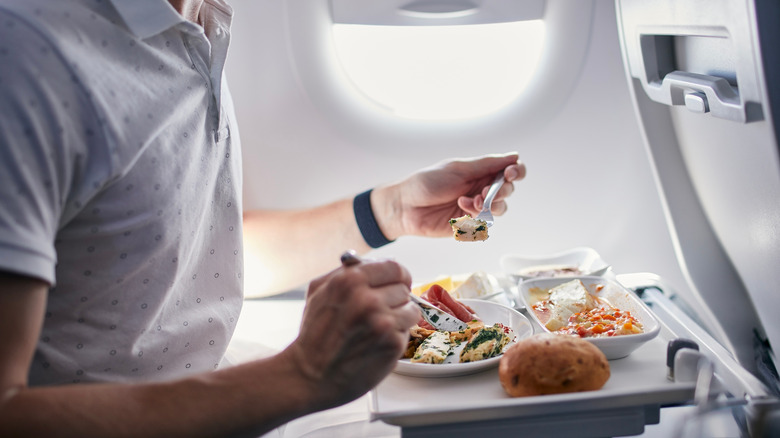Unsettling Details About The Safety Of Your In-Flight Meal
Frequent fliers know that airplane food isn't particularly tasty. Nevertheless, it gets the job done and provides a filling, albeit bland, meal for travelers. Unfortunately, in-flight meals could also potentially be harmful and cause illness. Before they are reheated and served on a flight, catering companies create airplane meals. Although the FDA monitors these entities, this does not necessarily guarantee food safety. According to a 2019 investigation conducted by NBC News, past inspections by the FDA of catering companies that produce airplane food uncovered cross-contamination, the use of faulty thermometers, and much more.
Additionally, NBC News revealed that some catering companies, particularly Flying Food Group and LSG Sky Chefs, had facilities that were contaminated with Listeria. This bacteria can lead to severe symptoms and can be fatal. Keep in mind that the FDA inspects airline catering companies every few years. Simply put, this gap in time means safety standards could easily be disregarded. However, it's not just the catering that could be at fault for unsafe food. Unstable food temperatures during the transportation process from the catering facility to the plane can also be an issue.
In an article for The Washington Post, gastroenterologist Aakash Aggarwal bluntly stated, "The chances of something going wrong are multifold." While everyone wants to steer clear of stomach issues while traveling, sometimes this isn't possible, especially if you've consumed an in-flight meal.
Infamous in-flight food poisoning incidents
There's a reason why you don't often hear about in-flight meals causing food-borne illnesses. Speaking to NBC News, environmental health inspector Roy Costa noted, "Outbreaks from airline food are very difficult to identify because the people get dispersed into various locations." Costa added, "It's not like having a cluster of people that you can identify all had one exposure, so it's difficult to pin them down." Despite this, there have been known cases where in-flight meals have caused extreme food poisoning. In early 1975, a flight taking Coca-Cola employees from Tokyo to Paris turned disastrous after almost 200 people became ill due to food poisoning.
Everything was hunky-dory until the flight stopped in Anchorage, Alaska, and passengers were provided with a ham omelet for breakfast. The flight then continued to its next destination, Copenhagen. However, on the way there, the passengers became violently ill with gastrointestinal symptoms, and many had to seek medical attention in Copenhagen (where most were hospitalized). As it turned out, the catering company cook who had made the ham omelets in Alaska had a staph infection, which resulted in the food poisoning.
In another example, per the New York Times, almost 1,000 individuals got food poisoning from British Airways in March 1984. The culprit was salmonella, reportedly stemming from an ingredient in hors d'oeuvres provided by the airline's catering company. One individual ended up dying due to the outbreak.
Have food poisoning on a flight? Here's what to do
Let's say disaster strikes and the in-flight meal you've been served makes you ill. First and foremost, talk to a flight attendant. They will likely provide you with an air sickness bag and ensure you can easily access the lavatory. Likewise, informing them that you believe the food the flight has provided has made you sick could avert your fellow passengers from suffering the same fate. Note that food poisoning can occur as early as 30 minutes after consuming tainted food. If the situation is dire, flight attendants can aid in getting you medical assistance. Of course, do what you can to stay hydrated.
To lessen your chances of getting food poisoning on a flight, food safety experts like Jean Dible told CNBC that travelers should stay away from certain food items that are susceptible to bacteria if not properly stored or handled. This includes salads, seafood, and dairy. With that in mind, you should also never order ice in your drink on a plane. Likewise, water on planes, used for drinks like coffee and tea, has been known to be contaminated with E. coli, according to previous testing conducted by the U.S. Environmental Protection Agency (EPA) in 2004.
Instead, Dible told the publication that passengers should choose pre-packaged snacks and drinks. Regardless, you might not get any food on an airplane — check out the reason why you sometimes don't get in-flight food and beverage service.


